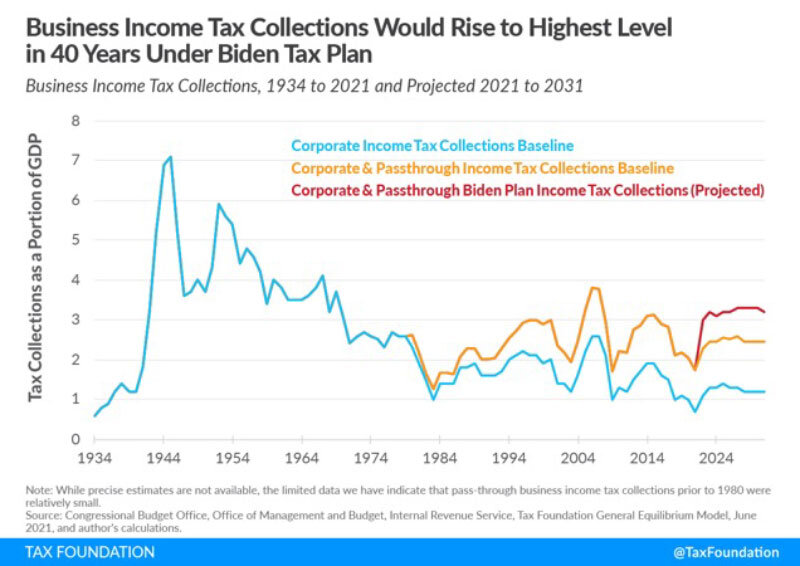Earlier this year President Biden released his plan for improving the U.S. infrastructure which would additional funding requiring a change in taxation. This plan is summarized in what is called the “Green Book.” Here are some of the major proposed tax changes that were included in the proposal for 2021:
- Top individual rate changed from 37% to 39.6%
- Top individual brackets moved down from $523,601 to $427,700
- Corporate tax rate increased from 21% to 28%
- 3.8% Net Investment Income Tax (NIIT) would apply to all income above $400,000
- Capital gains would be treated as ordinary income for those with income over $1,000,000
- 1031 exchanges would be limited to $1,000,000 annually
- Gifts and transfer of property at death would trigger capital gains taxed. 3.8% NIIT would be added to the capital gains tax rate (exclusion for transfer to spouse, charity, farmers* and some small businesses*)
- Transfers to trusts and partnerships trigger capital gains tax
- Trusts that have been in existence for 90+ years will be exposed to capital gains tax
These proposed changes are catalysts to generate revenue faster to fund the infrastructure costs. This new transfer tax concept intercepts the planning strategies of receiving a stepped-up basis at death. Income taxes would now be due on top of estate taxes. Therefore, the proposals did not include changes to the estate tax exemption amounts. Currently the $11,700,000 exemption per individual is sunsetting 2026 and reverting to $5,000,000 (indexed with inflation) per individual.
At first appears these estate changes do not seem like a drastic change, but now any asset with a lower basis will be taxed like a qualified plan. Income taxes will be due at death and then exposed to estate taxes if applicable. Both maximum rates are at 40%. That is huge!! For large estates, cash will be needed to fund income taxes and estate taxes. For smaller estates, cash will be needed for income taxes due to the loss of stepped-up basis. All these proposed changes are opportunities for our business and planning services.
When will this happen?
Ironically, July 4th was the first trigger date for these changes to be considered. A bipartisan Senate group is causing the delay. Both Democrats and Republicans are balking at the potential tax increases to fund the infrastructure costs. The latest change occurred today (July 19th) as US senators drop tax enforcement from the bipartisan bill. The intent was to increase IRS funding to bring in more tax revenue and thus decreasing the need to increase taxes. Currently the IRS is facing a backlog of 35,000,000 unprocessed tax returns. Most of these returns were filed in 2021. Recently it was released that 55 of the largest corporations in America paid no federal corporate income taxes in their most recent fiscal year. The timing of this release was not a coincidence to the consideration of additional funding to the IRS. Without the additional funding to the IRS to generate additional tax income, the map to meet the President’s plan must be redrawn. Until a bipartisan agreement is reached these proposals remain on paper with numbers shifting weekly.
Can the proposed changes be modified?
- There are a few modifications that have already happened within the proposed tax changes. There initially was a proposal to make the gift and estate planning changes retroactive to January 1, 2021. That provision has now been removed.
- Clarification for the stepped-up basis changes has been modified by the White House. It was clarified that farmers and small family-owned business are exempt as long as the farm or business stays within the family.
- The definition for $1,000,000 and $400,000 of income is vague. Is it gross? Is it AGI? Some have assumed that implies the same calculation as the 199A deduction used with the Trump era reforms.
- The Michael Jackson effect – it took 12 years to determine the value of Michael Jackson’s estate in tax court. A wealth tax, or something similar that calculates gains on an undetermined basis, will a fall into the already overburdened IRS administration.
- Changes are expected to be “marginal” vs drastic.
Perspective
“The last time federal business tax collections exceeded 3 percent of GDP on a sustained basis was in the 1960s, when the federal corporate tax rate approached or exceeded 50 percent. This was a time when the U.S. and many other advanced countries had relied heavily on corporate tax revenue to pay down national debt accumulated during World War II.
Since that time, most advanced countries reduced business taxes and specifically corporate taxes in recognition of competitive pressures and the economic costs of heavily taxing business. Biden’s plan amounts to a reversal of the trend and a return to heavy taxation of U.S. companies. It is not at all clear that foreign competitors will follow suit.” (Taxfoundation.org)

As changes continue to occur weekly and the bucket is being kicked down the road, changes in any of these taxes creates an opportunity for our services.
For questions or references, reach out to Tyson Ferney (801-826-2600 or tyson.ferney@allegisag.com) or Jameson Ferney (801-826-2601 or jameson.ferney@allegisag.com).






